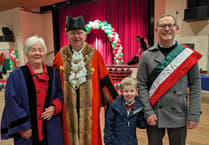A trio of famous names from the area have been inducted in to the latest edition of the Oxford Dictionary of National Biography.
Meredydd Evans, Robert Geraint Gruffydd and Roger Rees are among 226 contemporary figures who left their mark on the UK and who died in 2015 to be added to the ODNB.
The Oxford DNB is the national record of people who have shaped British history, worldwide, from prehistory to the year 2015.
The dictionary includes biographies of 60,984 individuals, written by 14,000 contributors.
Meredydd ‘Merêd’ Evans - Broadcasting executive, collector, editor, historian, performer, singer, political activist and polymath
Born 9 December 1919 at Top Pentre, Llanegryn, Gwynedd, he was named Meredith, but in no time at all he was called Meredydd, and for most of his life universally and affectionately known as Merêd.
Shortly before his first birthday the family settled in Tanygrisiau, Blaenau Ffestiniog.
He left school at 14 to become an apprentice shopkeeper at the local Co-operative store. Six years there embedded within him an understanding of human nature and an appreciation of the sacrifices made by working-class people.
He enrolled as a student in philosophy at Bangor where he gained a first-class degree.
Music became one of his passions and he was the mainstay of an enchanting close-harmony group known as Triawd y Coleg, for whom he composed many catchy songs which were broadcast live on Welsh-language radio programmes.
Evans was appointed tutor in philosophy and political science at Coleg Harlech.
He married Phyllis Kinney, a professional opera singer from Michigan, whom he met in Bangor.
In 1950, he entered the world of Welsh-language journalism, joining Y Cymro as assistant editor. But the pull of academic life was irresistible and two years later he enrolled as a postgraduate student at Princeton University in New Jersey, where he gained a doctorate in 1955.
He then took up a post as assistant professor at Boston University, but Wales tugged at his heartstrings and in 1960 he was appointed tutor in the extramural department at Bangor.
In 1963 he was appointed head of light entertainment at BBC Cymru/Wales Television, a new post tailor-made for him. Over 10 years he enjoyed considerable success as a spotter of talent and as a creative force.
He returned to academic life in 1973 when he joined the extramural department at Cardiff University, a post he held until his retirement in 1985.
Evans became remarkably well-versed in the provenance of Welsh folk songs and was a mainstay of Canu Gwerin, the house journal of the Welsh Folk Song Society.
He and his wife Phyllis were avid and meticulous researchers in the National Library of Wales and unwittingly entertained fellow readers by beating time and humming some of the melodies they discovered.
The chief priority in Evans’s life, however, was the fate of the Welsh language.
From the 1970s he immersed himself in strengthening the position of Welsh.
In 1979, in the company of two other prominent academics, he switched off the television transmitter at Pencarreg in Ceredigion in a bid to persuade the government to honour its promise to establish a Welsh-medium television channel.
In 1987 he ruffled feathers by launching an attack at the National Eisteddfod on central and local government for ignoring the cultural effects of the large-scale inward migration of monoglot English-speakers into rural areas such as Cwmystwyth, where he had made his home in 1985.
He was awarded an honorary DLitt by the University of Wales in 1998 as well as honorary fellowships by the universities of Aberystwyth and Bangor and the Welsh National College.
Following a stroke, he died on 21 February 2015 at Bronglais General Hospital, Aberystwyth.
Robert Geraint Gruffydd - Leading scholar in Welsh literature
A Welsh scholar, born on 9 June 1928 at Egryn, Talybont, Gwynedd, he was initially educated at Dyffryn Ardudwy elementary school, but in 1933 his father accepted a post at the Welsh Plant Breeding Station at Aberystwyth and the family moved in 1936 to Pwllpeiran, one of the station’s experimental farms.
Gruffydd’s education continued at Cwmystwyth elementary school, Ardwyn grammar school, Aberystwyth, and Gordonstoun School, which had been temporarily relocated to Llandinam, Powys, during the Second World War.
Gruffydd graduated in Welsh and married 27-year-old Elizabeth Eluned ‘Luned’ Roberts.
Following two years as an editorial assistant with Geiriadur Prifysgol Cymru (The University of Wales dictionary) at Aberystwyth, Gruffydd was appointed a lecturer in Welsh at Bangor in 1955.
He remained there until 1970 when he was appointed to the chair of Welsh at the University College of Wales, Aberystwyth.
In 1980 he became the sixth librarian of the National Library of Wales before returning to mainstream academic life in 1985 as director of the newly inaugurated Centre for Advanced Welsh and Celtic Studies at Aberystwyth.
He was elected a fellow of the British Academy in 1991 and retired from his post at Aberystwyth in 1993.
Following retirement Gruffydd remained academically active, serving as president of the International Congress of Celtic Studies (1993–2003) and becoming consultant editor of Geiriadur Prifysgol Cymru in 1999.
He also served Aberystwyth University as vice-president between 1996 and 2001.
He died of prostate cancer and heart failure at his home in Aberystwyth on 24 March 2015.
Roger Rees - Actor and theatre director
The actor and theatre director was born on 5 May 1944, son of William John Albert Rees, an Aberystwyth police constable, and his wife Doris Louise, née Smith, a shop worker.
Rees appeared in Ralph Reader’s The Gang Show at the Golders Green Hippodrome in 1963 and was painting scenery at the Wimbledon Theatre, then run by one of the last actor-managers, Arthur Lane, when a casting crisis propelled him onto the stage in 1964 as the lead in Hindle Wakes by Stanley Houghton.
He failed an audition for the Royal Shakespeare Company in 1965 but, after a season at the Pitlochry Rep in Scotland, he joined the RSC in 1967, playing small roles, until he emerged as a shining bright prospect, quick and charming, with a rare ability to move an audience from laughter to tears in a flash, and made a notable 1974 Broadway debut with the company in Dion Boucicault’s London Assurance.
Rees’s first major roles with the RSC were as Antipholus of Syracuse in Trevor Nunn’s glorious musical version of The Comedy of Errors in 1976, a deeply touching Tuzenbach in Nunn’s brilliant Three Sisters by Chekhov (1978), and the leading role of Semyon in Nikolai Erdman’s 1928 classic, The Suicide, in 1979.
The timing was perfect for his career-defining performance at the head of the RSC ensemble in The Life and Adventures of Nicholas Nickleby (1980), adapted into two three-hour plays by David Edgar.
The show, directed by Trevor Nunn and John Caird, stormed the West End and Broadway, winning Rees, as Nickleby, both an Olivier and a Tony best actor award. It was later filmed by Channel 4 television.
While in New York with the show, Rees met the American writer and director Rick Elice and they remained partners for the rest of Rees’s life.
Rees appeared in two highly successful television shows in America which established him as a first-choice British ‘type’.
In Cheers he was Kirstie Alley’s love interest as the millionaire industrialist Robin Colcord and, in The West Wing, he was Lord John Marbury, the British ambassador to Washington.
He converted to Judaism to share his partner’s religion and was granted US citizenship in 1989.
Rees died from stomach cancer at his home in Manhattan on 10 July 2015.




